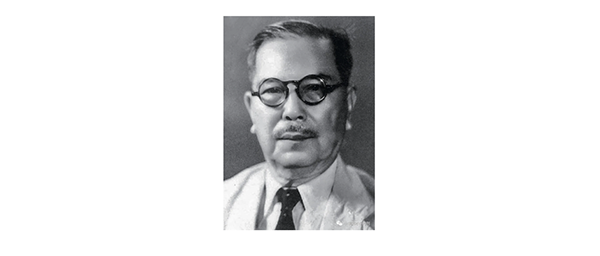
Tan Kah Kee (1874-1961) was born in Jimei Community, Tong'an
County, Quanzhou Prefecture, Fujian Province, now known as Jimei District,
Xiamen. A distinguished leader among overseas Chinese, he was also an
accomplished entrepreneur, educator, philanthropist, and social activist. At
17, he moved to Singapore, where he built a thriving business through his adept
management skills, eventually becoming one of Southeast Asia's prominent
overseas Chinese businessmen.
In 1913, Tan returned to his hometown and founded several
educational institutions, including Jimei Primary School, Jimei Middle School,
Jimei University, and Xiamen University. In 1949, he was invited by Chairman
Mao Zedong to China to participate in the preparatory meeting of the Chinese
People's Political Consultative Conference (CPPCC). Tan served as Vice Chairman
of the CPPCC National Committee, a member of the Standing Committee of the
National People's Congress, and Chairman of the All-China Federation of
Returned Overseas Chinese.
Throughout his life, Tan Kah Kee made remarkable contributions
to national education, the Anti-Japanese War, and the construction of New
China. He is revered as "the banner of overseas Chinese and the
glory of the nation."
The 2024 Fujian Press Trip for Overseas Chinese Media, themed
"Pursuing Dreams in China · Promoting Tan Kah Kee's Spirit in the New
Era," recently concluded successfully. Organized by the All-China
Federation of Returned Overseas Chinese and undertaken by the Fujian Federation
of Returned Overseas Chinese, the event saw participation from Lin Qiongsi,
Assistant to the President and Head of the International Media Center of MCG.
Media representatives from 18 countries and regions, including the United
States, Australia, Egypt, Germany, Russia, Madagascar, Canada, and the United
Arab Emirates, along with representatives from overseas Chinese-related central
media, also took part in this meaningful event.
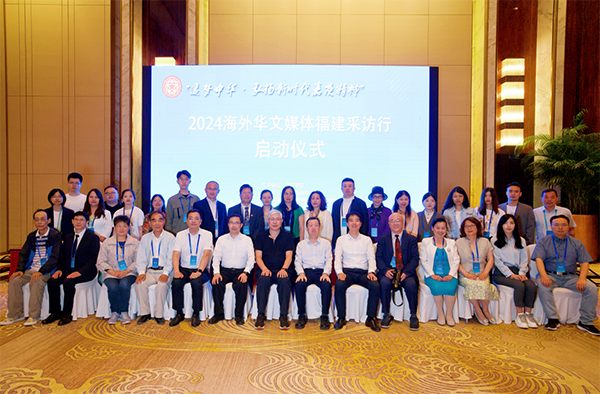
The 2024 Fujian Press Trip
for Overseas Chinese Media themed "Pursuing Dreams in China · Promoting
Tan Kah Kee's Spirit in the New Era" was launched in Fuzhou
Spanning seven enriching days, the event was expertly guided by
Zuo Zhiqiang, Director of the Information Communication Department of the
All-China Federation of Returned Overseas Chinese, who led the press corps with
dedication and passion. From May 11th to 17th, the delegation embarked on a
journey tracing the footsteps of Tan Kah Kee. They delved into immersive
interviews and thorough investigations within overseas Chinese communities such
as Fuzhou, Quanzhou, and Xiamen, effectively promoting the legacies of Tan Kah
Kee and the cultural richness of Fujian to overseas compatriots.
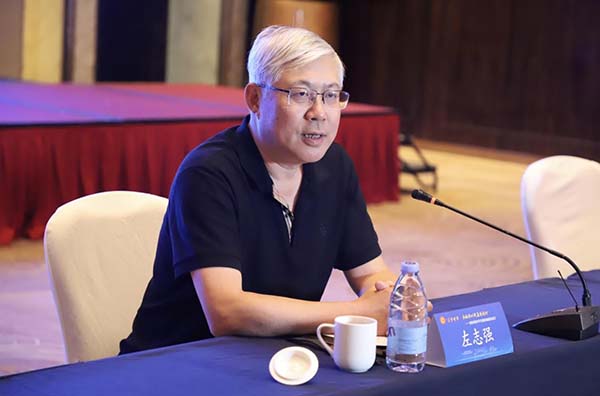
Zuo Zhiqiang, the Director
of the Information Communication Department of the All-China Federation of
Returned Overseas Chinese, delivered a speech at the launch ceremony
At the launch ceremony, Zuo Zhiqiang emphasized the paramount
importance the All-China Federation of Returned Overseas Chinese places on
advancing ideological and cultural endeavors. Under the guidance of the Party
Leadership Group, the Information Communication Department has meticulously
orchestrated various thematic activities under the banner of "Pursuing
Dreams in China." They have ingeniously rolled out a series of promotional
initiatives tailored to overseas Chinese audiences, leveraging the language and
sentiments closest to their hearts.
Zuo Zhiqiang underscored the significance of deeply studying and
implementing the spirit of the 11th National Congress of Returned Overseas
Chinese and Relatives. He stressed the pivotal role of Federation cadres in
advancing the Party's overseas Chinese affairs, urging extensive unity among
overseas Chinese compatriots, including media representatives, to narrate
China's narrative and amplify its voice. Notably, he highlighted the monumental
achievements of the Party and the nation since the founding of the People's
Republic of China 75 years ago and the 18th National Congress of the Communist
Party of China.
In commemoration of the 150th anniversary of Tan Kah Kee's
birth, the All-China Federation of Returned Overseas Chinese has spearheaded
numerous commemorative initiatives, of which this press trip stands as a
significant endeavor. Its purpose is to perpetuate the "Tan Kah Kee
spirit" through innovative expressions within the overseas Chinese media
landscape, aligning with the characteristics of the new era. This aims to
inspire overseas Chinese compatriots to contribute to modernization efforts,
illuminate Fujian's developmental journey, disseminate Chinese culture, and
showcase China's global image.
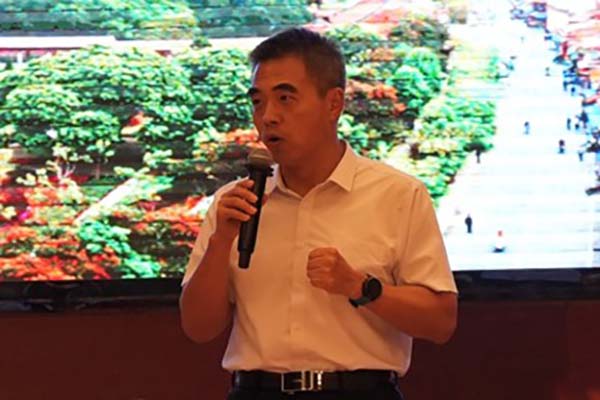
Yao Fei, Deputy Mayor of
Quanzhou Municipal Government, delivered a speech
During the press corps' visit and investigation in Quanzhou, Yao
Fei, Deputy Mayor of Quanzhou Municipal Government, extended a warm welcome. He
highlighted Fujian's pivotal role as both a cradle and a testing ground for Xi
Jinping Thought on Socialism with Chinese Characteristics for a New Era.
Quanzhou, one of Fujian's three major cities, holds significant historical
importance as the starting point of the ancient "Maritime Silk Road"
and as a renowned homeland for overseas Chinese in China. It boasts a sizable
community of approximately 9.5 million Quanzhou overseas Chinese and
compatriots residing across more than 170 countries and regions.
Yao Fei underlined Quanzhou's historical significance as a key
gateway for China's foreign economic and cultural exchanges during the Song and
Yuan dynasties, embodying deep cultural roots. Presently, Quanzhou is actively
implementing General Secretary Xi Jinping's directives, seamlessly integrating
and contributing to the overarching vision of jointly building the "Belt
and Road" initiative. The city is dedicated to leveraging its rich
historical and resourceful advantages, transforming them into new developmental
opportunities. With a focus on cultural guidance, economic and trade
cooperation, and enhanced connectivity, Quanzhou is committed to crafting a new
emblem of foreign exchanges in the new era, embodying the spirit of cultural
heritage and dynamic progress.
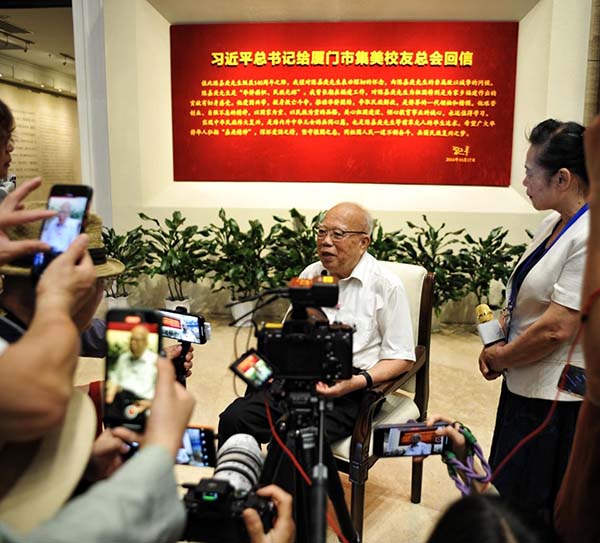
Ren Jingbo, the Permanent
Honorary President of the Jimei Alumni Association, accepted an interview
In Xiamen, the press corps embarked on a profound journey,
visiting significant landmarks that resonate with the enduring legacy of Tan
Kah Kee. Their itinerary included stops at Aoyuan, the Tan Kah Kee Memorial
Hall, Xiamen Tongmin Hospital (also known as the Fifth Hospital of Xiamen), Tan
Kah Kee's former residence, and the Overseas Chinese Museum. Additionally,
engaging discussions and exchanges took place with representatives of experts
and scholars at Xiamen University.
During this enlightening period, Ren Jingbo, the Permanent
Honorary President of the Jimei Alumni Association, shared profound insights
during an interview. He highlighted Tan Kah Kee's lifelong dedication to
advancing education, supporting revolutionary efforts, fostering unity among
overseas Chinese, and driving social progress. Ren Jingbo expressed his earnest
hope that Chinese media friends would play an instrumental role in further
promoting the "Tan Kah Kee spirit." He encouraged them to share
compelling narratives about Tan Kah Kee, ensuring that his spirit perseveres
through generations to come, inspiring future endeavors and enriching the
collective consciousness of society.
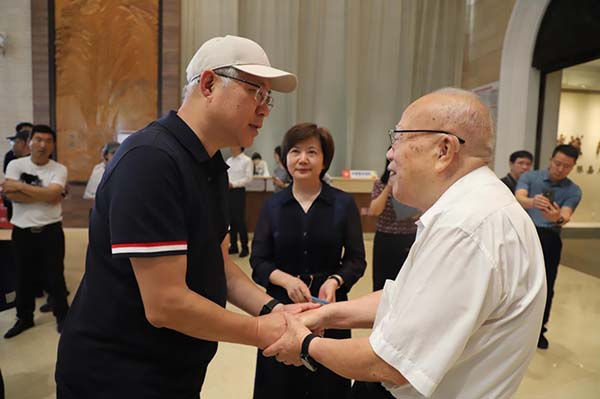
Zuo Zhiqiang (left), the
Director of the Information Communication Department of the All-China
Federation of Returned Overseas Chinese, and Ren Jingbo, the Permanent Honorary
President of the Jimei Alumni Association, shook hands cordially
Ren Jingbo, a distinguished graduate of Jimei School during the
early days of New China's founding, shared a special bond with "the
headmaster," Mr. Tan Kah Kee. His profound admiration for Tan Kah Kee led
him to write a heartfelt letter to General Secretary Xi Jinping on the occasion
of the 140th anniversary of Tan Kah Kee's birth in 2014. Representing the Jimei
Alumni Association and himself, Ren Jingbo conveyed the sentiments and
aspirations of Jimei alumni and followers of Tan Kah Kee worldwide.
In his response to the Jimei Alumni Association, General
Secretary Xi Jinping highlighted the importance of perpetuating the "Kah
Kee spirit." He expressed his hope that overseas Chinese and ethnic
Chinese would uphold patriotism, embrace the noble ambition of serving the
country, and join hands with fellow compatriots in relentless pursuit of the
dream of national rejuvenation. This exchange underscores the enduring
significance of Tan Kah Kee's legacy and its profound impact on the collective
consciousness of Chinese communities worldwide.
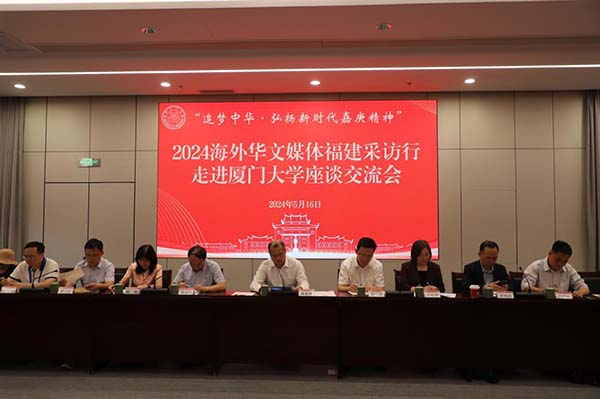
The Information
Communication Department of the All-China Federation of Returned Overseas
Chinese held an overseas Chinese media symposium on "Pursuing Dreams in
China and Promoting the Tan Kah Kee Spirit in the New Era" at Xiamen
University
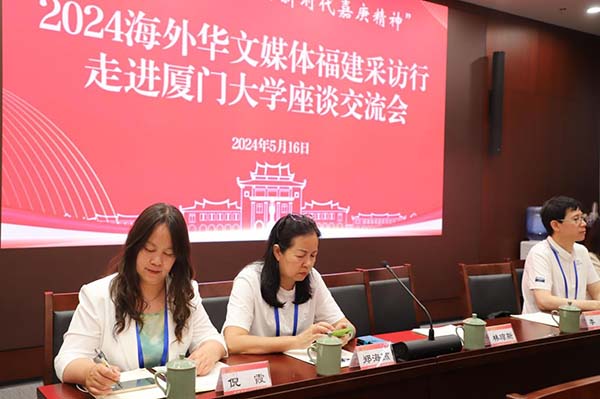
Representatives of MCG
International Media Center attended the meeting
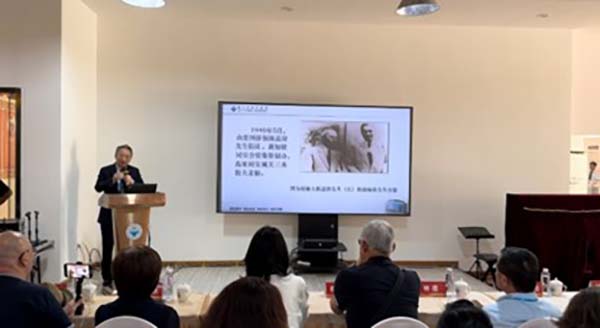
Huang Jiyi, the director
of Xiamen Tongmin Hospital, gave a special presentation
Founded by Tan Kah Kee in 1947, Xiamen Tongmin Hospital has
flourished over 77 years of unwavering dedication and growth. Evolving into a
modern, expansive public tertiary comprehensive hospital, it seamlessly
integrates medical treatment, teaching, and scientific research. Tongmin
Hospital has achieved remarkable milestones in medical technology and service
quality, earning prestigious accolades such as ranking among the top 100
provincial hospitals and top 100 smart hospitals in China's hospital competitiveness
for five consecutive years. The hospital's commitment to excellence has
garnered national recognition, including distinctions such as the
"Management Innovation Hospital" and "Humanistic Caring
Hospital," positioning it as a trailblazer in Fujian Province's medical
landscape and beyond.
In an interview with reporters, Huang Jiyi, the hospital
director, underscored the profound influence of the "Tan Kah Kee
spirit" on their institution. He emphasized that this spirit serves as
both a guiding compass for their professional development and a foundational
principle in their approach to caring for life and health. With a focus on
humanistic care, Tongmin Hospital prioritizes compassion as the cornerstone of
medical services. They believe in the transformative power of empathy, capable
of fostering medical miracles and alleviating patients' suffering. Just as Tan
Kah Kee deeply cared for the people of his homeland, Huang Jiyi and his team of
doctors are steadfastly upholding and propagating the "Tan Kah Kee
spirit" through tangible actions, contributing their expertise to the
global pursuit of health and well-being.
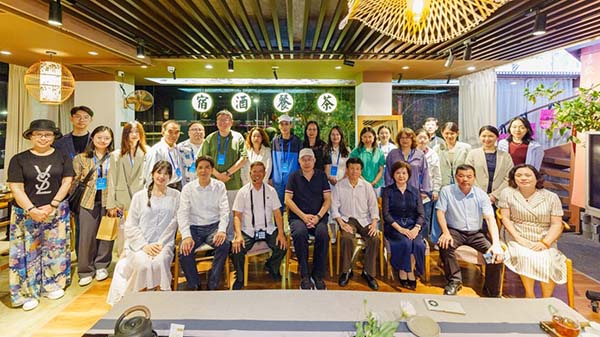
The press corps visited
Xiamen
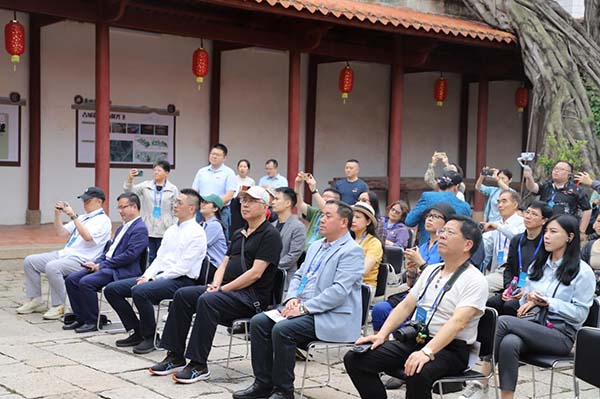
The press corps visited
Quanzhou
During the interview, the press corps gained profound insights
into Fujian's economic and social progress while deepening their understanding
of the enduring essence of the "Tan Kah Kee spirit" in the
contemporary era. Lin Qiongsi eloquently highlighted Tan Kah Kee's indelible
contributions to pivotal historical events such as the Revolution of 1911, the
War of Resistance Against Japan, national education, and the construction of
New China.
Tan Kah Kee's enduring legacy lies in his unwavering commitment
to education. He dedicated extensive resources and time to establishing and
supporting numerous schools, generously donating vast sums of money that
yielded remarkable outcomes. Tan Kah Kee emerged as a pioneer and exemplar of
philanthropy in modern China, inspiring countless others to follow suit. His
actions not only facilitated the establishment of a robust educational
infrastructure but also fostered a cultural ethos that prioritized the importance
of learning. This enduring legacy continues to reverberate throughout China's
educational landscape, shaping its trajectory to this day.
The "Tan Kah Kee spirit" transcends mere symbolism; it
embodies a potent spiritual force that ignites the fervor for excellence among
the people of Fujian and overseas compatriots alike. It serves as a beacon,
guiding individuals to strive tirelessly towards the prosperity and strength of
the nation and its people. Tan Kah Kee's legacy endures as a timeless testament
to the transformative power of dedication, generosity, and unwavering
commitment to the greater good.
As a beacon of patriotism, integrity, thrift, and
self-improvement, the "Tan Kah Kee spirit" stands as a cherished
value that resonates deeply within MCG's cultural ethos. It epitomizes the
principles MCG holds dear and endeavors to uphold. Embracing and perpetuating
such esteemed cultural traditions is integral to fostering the development of a
learning organization.
Throughout MCG's journey, the essence of the "Tan Kah Kee
spirit" serves as an enduring source of inspiration, propelling the
company forward. Rooted in a commitment to continuous learning and open
communication, MCG constantly endeavors to expand its horizons and enhance the
team's capacity for sustainable development. By prioritizing learning as the
driving force and communication as the bridge, MCG remains steadfast in its
pursuit of excellence, poised to contribute meaningfully to the company's
long-term growth and to the realization of the Chinese Dream of
national rejuvenation.
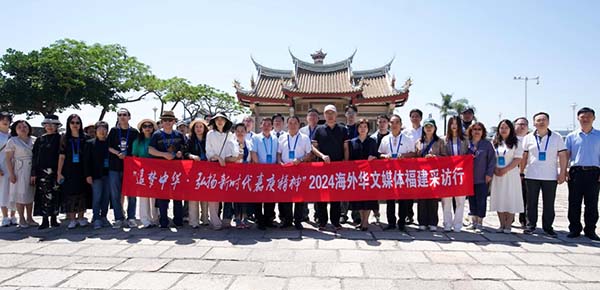
The 2024 Overseas Chinese
Media Fujian Press Corps for "Pursuing the Chinese Dream and Promoting the
Tan Kah Kee Spirit in the New Era" took a group photo in Aoyuan
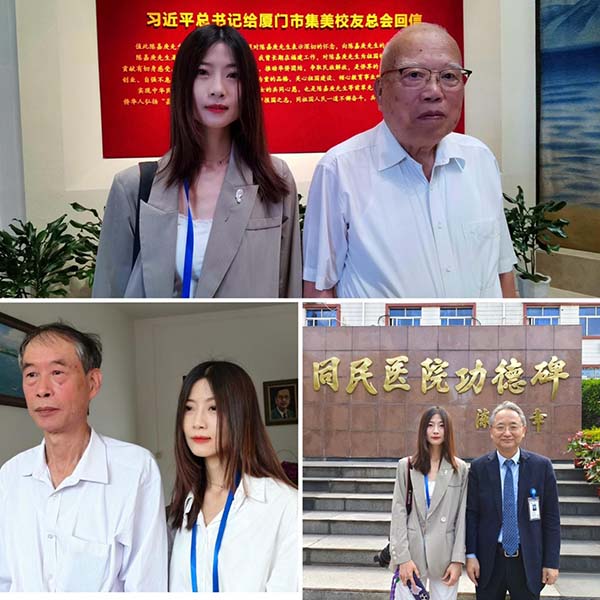
Lin Qiongsi, the
representative of MCG's International Media Center, took photos with Ren Jingbo
(top), the perpetual honorary president of the Jimei Alumni Association; Chen
Zhongxin (bottom left), the nephew's grandson of Mr. Tan Kah Kee and the supervisor
of the Tan Kah Kee Foundation; and Huang Jiyi (bottom right), the director of
Xiamen Tongmin Hospital
Attachment:
A list of schools founded, funded, and
supported by Tan Kah Kee.
(I)Jimei
Academician Village (Founded and Developed): 24 schools in total
Jimei
Kindergarten (originally named Jimei Nursery in 1919)
Jimei Primary School (merged and developed in 1936 from the Township-run Jimei
Two-tier Primary School founded in 1913 and Jimei Girls' Primary School founded
in 1917)
Jimei Middle School (merged in 1934 from Jimei Middle School founded in 1918,
Jimei Girls' Normal School founded in 1921, which was renamed Jimei Girls'
Junior High School in 1927)
Jimei Normal School (i.e. male teachers' school, founded in 1918, stopped
enrollment in 1936)
Jimei Infant Normal School (founded in 1927, merged into Jimei Normal School in
1934)
Jimei Experimental Rural Normal School (founded in 1932, merged into Jimei
Normal School in 1934)
Jimei Sinology Specialized School (founded in 1926, transferred to and run by
the Department of Liberal Arts of Xiamen University in 1927)
Jimei Maritime College and Jimei Aquatic School (originated from Jimei Aquatic
Department founded in 1920, renamed as Jimei Aquatic Maritime School in 1927,
and Jimei Senior Aquatic Maritime Vocational School in 1935. Later, Jimei
Aquatic Maritime School was divided into Jimei Aquatic School and Jimei
Maritime School in 1958. Jimei Maritime School became Jimei Maritime College in
1989, after being Jimei Maritime Polytechnic School in 1979)
Jimei Finance College, Jimei Finance and Economics School, and Jimei Light
Industry School (originated from Jimei Commercial Department founded in 1920,
renamed as Jimei Commercial School in 1927, and Jimei Senior Commercial
Vocational School in 1935. In 1952, it was renamed as Jimei Finance and
Economics School, then Jimei Light Industry School in 1959, and renamed again
in September 1960. In 1965, it was divided into Finance and Economics School
and Light Industry School. In 1985, Jimei Finance and Economics School
established Jimei Finance College based on its secondary school, operating
under two names)
Jimei Agriculture and Forestry School (founded in 1926, renamed as Jimei Senior
Agriculture and Forestry Vocational School in 1935, stopped operating in 1947,
specializing in farm operations)
Jimei Aquatic and Maritime Polytechnic School (established in 1951, merged into
Fujian Maritime Polytechnic School in 1952)
Jimei Overseas Chinese Students Remedial School (founded in 1953, entrusted by
the Central Overseas Chinese Affairs Commission)
Jimei Overseas Chinese Descendants Remedial School (attached to Jimei Overseas
Chinese School in 1957)
Jimei Aquatic Polytechnic School (founded in 1958)
Jimei Chinese Language and Culture School (added to Jimei Overseas Chinese School
in 1982, operating under two names)
Jimei Normal Polytechnic School (renamed Xiamen Normal Polytechnic School in
Jimei to commemorate Tan Kah Kee's emphasis on teacher education in 1980)
Fujian Institute of Physical Education (reopened in 1978, using the premises of
Jimei Maritime Club built under the auspices of Tan Kah Kee)
Xiamen Aquatic College (Shanghai Aquatic College moved to the premises of Jimei
Aquatic School and Jimei Aquatic Polytechnic School in 1972. In 1979, the
Shanghai and Xiamen Aquatic College Branches separated, with Shanghai Aquatic
College returning to Shanghai. Xiamen Aquatic College remained in Jimei. In
1987, the Xiamen Branch of the Central Agricultural Management Cadre Institute
was established, operating under two names).
(II) Xiamen City
(Founded and Supported): 2 schools
Xiamen
University (founded on April 6, 1921, voluntarily and unconditionally handed
over to the Ministry of Education of the National Government and changed to a
national university in July 1937).
Xiamen Public School (located in Model New Area)
(III) Tong'an
County (Founded and Supported): 61 schools
Le'an Primary
School (founded in Sunzuoshe in 1920), Tong'an Fangshan Middle School (formerly
the branch of Jimei Junior High School located in Maxiang in September 1945,
Tong'an No. 2 Middle School), Tong'an No. 1 Middle School (founded in Lianhua
Anbing in 1940 under the instructions of Tan Kah Kee, the founder).
Nanyang Girls' School (originally located in the city's Martial Arts Temple,
now closed), Jiyou Primary School (now Datong Central Primary School), Hengshan
Primary School (now Hengshan Central Primary School), Hepu Primary School (now
Gaopu Central Primary School), Xingwen Primary School (now Suchuo Primary
School), Jinshan Primary School (now Guzhai Jinshan Primary School), Jiaowei
Primary School, Shawei Primary School (now Shamei Primary School), Dongling
Primary School (now Ganling Primary School), Guanghua Primary School (now
Liuwudian Guanghua Primary School), Hujing Primary School, Hengbao Primary
School (now Meifeng Primary School), Liancun Primary School (now Daitou Primary
School), Dongyuan Primary School, Yuxiu Girls' School (located in Liuwudian,
closed in 1931), Baipo Primary School (now Hongcuo Baipo Primary School),
Yaojiang Primary School (now Yaotou Primary School), Changxing Primary School
(located in Guzhai Xiapu, closed in 1935), Yangzheng Primary School (now Meilin
Primary School), Lequn Primary School (now Houping Lequn Primary School),
Songshan Primary School (now Pengcuo Songshan Primary School), Yutian Primary
School (now Tianyang Primary School), Xinmin Primary School (now Xinxi Central
Primary School), Min'an Primary School (now Xucuo Primary School), Yangxin
Primary School (now Meixi Primary School), Mingde Girls' School (located in
Gaopu, closed in 1928), Liming Girls' School (located in Maxiang Street, closed
in 1931), Ximing Primary School (now Sudian Ximing Primary School), Yunshan
Primary School (now Xiangqiao Central Primary School), Baowei Primary School
(now Tingxi Central Primary School), Dijiang Primary School (now Bingzhou
Primary School), Qiming Primary School (now Zhaogang Qiming Primary School),
Lianshan Primary School (now Lianhua Central Primary School), Qimin Primary
School (now Kuanyu Primary School), Xinlun Primary School (now Hongxi Yifu
Primary School), Sheshan Primary School (now Daxiang Sheshan Primary School),
Yicheng Primary School (now Biyue Primary School), Qixi Primary School (now
Xike Primary School), Guanshan Primary School (now Neigong Primary School),
Jintian Primary School (now Dunzhi Primary School), Chenglin Primary School
(now Chengchang Primary School), Hengjiang Primary School (now Hengcuo Primary
School), Houting Primary School (now Shanting Primary School), Qizhi School
(destroyed by Japanese bombs in Maxiang Street in 1939), Youmin Primary School
(located in Maxiang Street, now Maxiang Central Primary School), Yunling
Primary School (now Shiban Primary School), Dongshi Primary School (now Houtian
Primary School), Fenglin Primary School, Jiheng Primary School (located in
Xiayang), Rende Primary School (located in Xiadian), Xiting Primary School,
Jiumu Primary School (now Jingtou Jiumu Primary School), Juemin Primary School
(now Aotou Juemin Primary School), Yangdi Primary School, Xiacai Primary
School, and Longxi Primary School (all located in Duishan), Lianjiang Primary
School (originally belonging to Nanan, now Tong'an Lianhe Primary School).
(IV) 23 Schools
Founded, Sponsored, and Commissioned by Various Counties and Cities in Fujian
Province (Excluding Tong'an County):
Anxi Public School, Anxi Canshan Primary
School, Jinmen Public School (now Zhongzheng National Primary School), Jinmen
Bishan School (now Anlan National Primary School), Hui'an Public School, Zhaoan
Public School, Yongding Public School, Zhangpu Public School, Shanghang Public
School, Longyan Public School, Dongshan Public School, Shima Public School,
Haicheng Public School, Yunxiao Public School, Xianyou Public School, Dehua
Public School, Yongchun Public School, Private Quanzhou Middle School (now Quanzhou
No. 6 Middle School), Fuzhou Sanmin Middle School (located in Aofengfang), Anxi
Chongde Middle School (the predecessor was the Changkang Branch of Jimei Junior
High School established in February 1945), Nanan Guozhuan Primary School and
Guoguang Middle School (founded by Li Guangqian, the son-in-law of Tan Kah
Kee), and Hui'an Heshan Middle School (founded by Tan Kah Kee on behalf of the
overseas Chinese Liu Yushui).
(V) Singapore
(participated in the establishment, sponsorship, or support) total 10:
Daonan School, Aitong School, Chongfu
Girls' School, Nanyang Chinese High School, Nanyang Chinese Girls' High School,
Aquatic and Navigation School, Nanyang Chinese Normal School, Guanghua School.
Sponsored Anglo-Chinese School, supported the proposed Singapore University.
Total 120
schools.
References:
[1] "Memories of Southern Overseas Chinese"
[2] "Jimei Weekly"